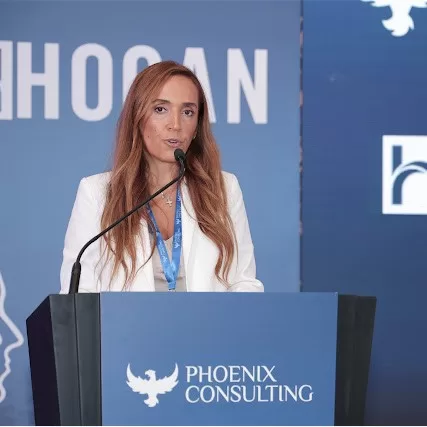Wael Salem
Egypt is at a crucial point in its economic development journey. To succeed and grow sustainably, Egypt needs to make the most out of its talented human capital. Using effective assessment methods to build strong leadership that can thrive in uncertain times is the way forward. As a Hogan distributor represented in Egypt, Seniora El Hage tackles during this interview how to use the right solutions to answer this dilemma and increase the Egyptian companies’ productivity and performances.
Can you describe the leadership style and motivation that is specific to business leaders in Egypt?
Business executives in Egypt frequently display a leadership style that is defined by a strong sense of vision, flexibility, and an emphasis on developing relationships. The business landscape in Egypt is diverse and dynamic, and effective leaders surely navigate a variety of challenges.
Business leaders in Egypt often demonstrate a visionary mindset by putting a strong emphasis on long-term objectives and tactics. They recognize that in order to remain competitive in quickly changing industries, it is critical to foresee market trends and embrace innovation.
They are also well aware of the importance of adapting to changing economic conditions, environments, and global market trends, which is why flexibility and resilience are key attributes, allowing them to navigate uncertainties and capitalize on emerging opportunities.
It is important to mention that understanding and respecting the local culture is integral to effective leadership in Egypt.
Business leaders who appreciate and embrace the cultural nuances of the country are better positioned to build strong relationships and navigate the different aspects of the business environment.
That in addition to investing in the development of local talent where many leaders prioritize education and training initiatives to empower their workforce and contribute to the overall skill development of the Egyptian workforce.
In summary, the leadership style of business leaders in Egypt is characterized by vision, adaptability, strong interpersonal skills, a commitment to cultural values, and a sense of purpose in contributing to the nation’s progress. These qualities enable leaders to drive sustainable growth in the Egyptian market.
How can business leaders in Egypt enhance their performance in times of unexpected change?
In times of unexpected change, business leaders in Egypt can enhance their performance by adopting agile leadership strategies. This involves quick decision-making, fostering a culture of flexibility, and maintaining transparent communication with stakeholders. Additionally, investing in employee skill development, embracing technology for remote work, and regularly reassessing and adapting strategic plans are key measures. Collaboration, prioritizing employee well-being, and staying informed about government policies also contribute to navigating uncertainties successfully.
How can companies in Egypt strategically leverage assessment tools to facilitate employee growth and productivity?
By integrating assessment tools within the talent management processes, businesses in Egypt can gain valuable insights into employees’ strengths, areas for development, and overall performance. This data can inform targeted training and development programs, allowing employees to enhance their skills and contribute more effectively to the organization. Additionally, assessments can aid companies in identifying high-potential individuals for leadership roles, fostering talent pipelines.
Additionally, the continuous feedback and performance reviews based on the assessment results promote a culture of accountability and improvement. Ultimately, the strategic use of assessment tools empowers companies to align employee capabilities with organizational goals, driving overall growth and productivity.
Can you share with us few success stories of Egyptian companies that have thrived through leveraging assessment tools to encourage transformational leadership?
The National Bank of Egypt (NBE) is currently utilizing Hogan Assessments with a large pool of candidates through their Talent Development programs and Internal Promotions program, namely, the Future Branch Managers’ Assessments as well as the Promotions for GMs, DGMs, Manager, and Deputy Managers on a yearly basis.
Hogan Assessments provided NBE with an effective alternative to their standard Assessment Center approaches, which was showcased through shorter assessment evaluation timeline, a more cost-effective choice, and definitely based on data and science.
In addition to Hogan being a highly dependable assessment tool and internationally recognized for their reliability and validity.
Can you tell us more about the pan-African conference that you hosted? What encouraged you to hold the first Hogan conference in Africa?
The virtual Hogan pan-African conference held last month was an exciting initiative aiming to unite thought leaders and experts from diverse Human Resources, Learning & Development, and Talent Management fields across the market to have the opportunity to learn about leadership performance and resilience during times of volatility, how to use assessments to promote leadership for disruption, and how to integrate values assessment to develop a certain culture.
Our motivation for hosting the Hogan Conference in Africa stems from a commitment to promoting inclusivity and recognizing the significant contributions Africa has made and continues to make to the global community. Africa is a continent of rich heritage, dynamic economies, and a burgeoning youth population that is driving innovation and change. We aim to showcase the potential for growth, development, and collaboration that exists within the African context.
The Hogan Conference seeks to spotlight the incredible talent, innovation, and potential within Africa. We aim to address pressing challenges, showcase the continent’s achievements, and encourage cross-sector partnerships.






Discussion about this post